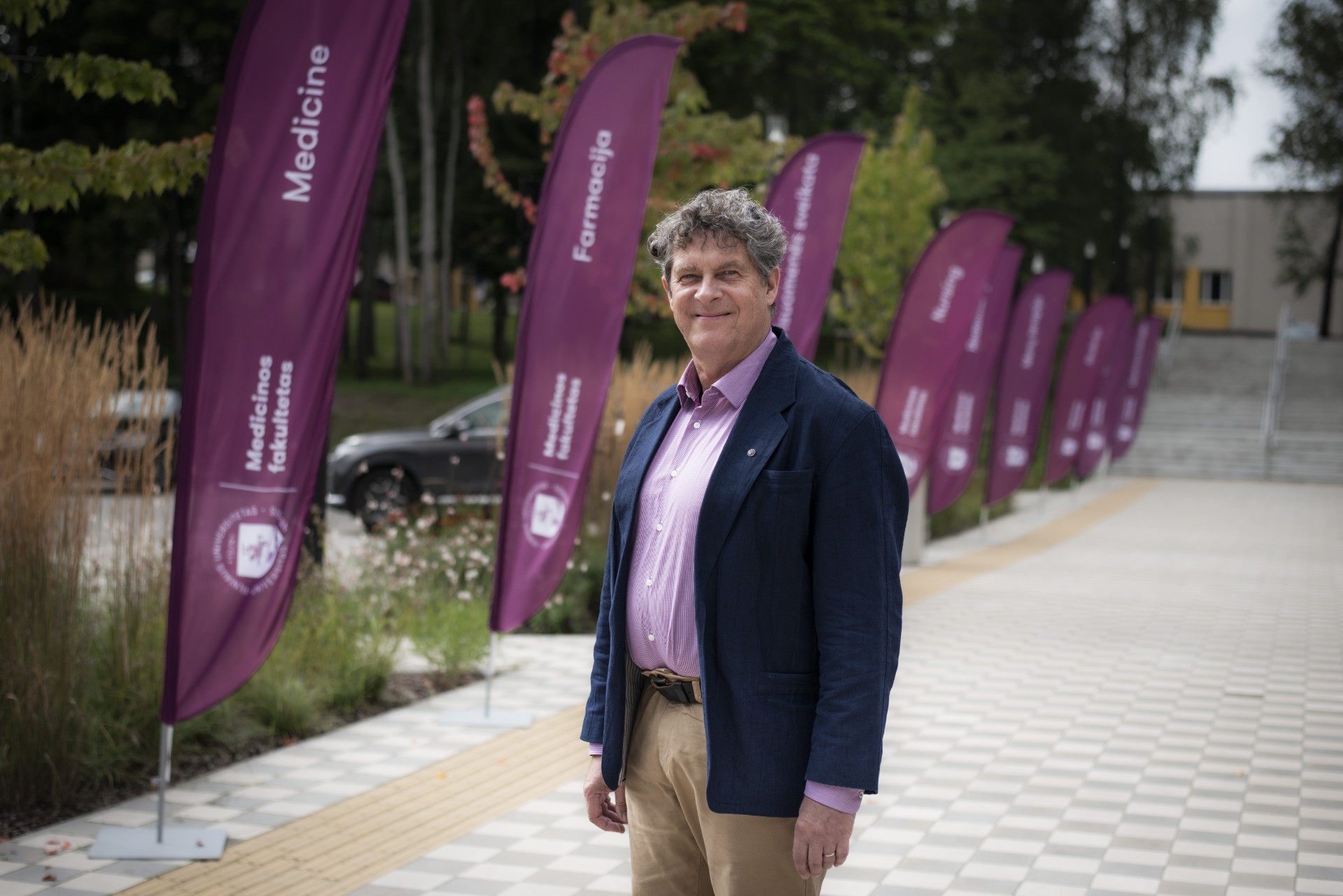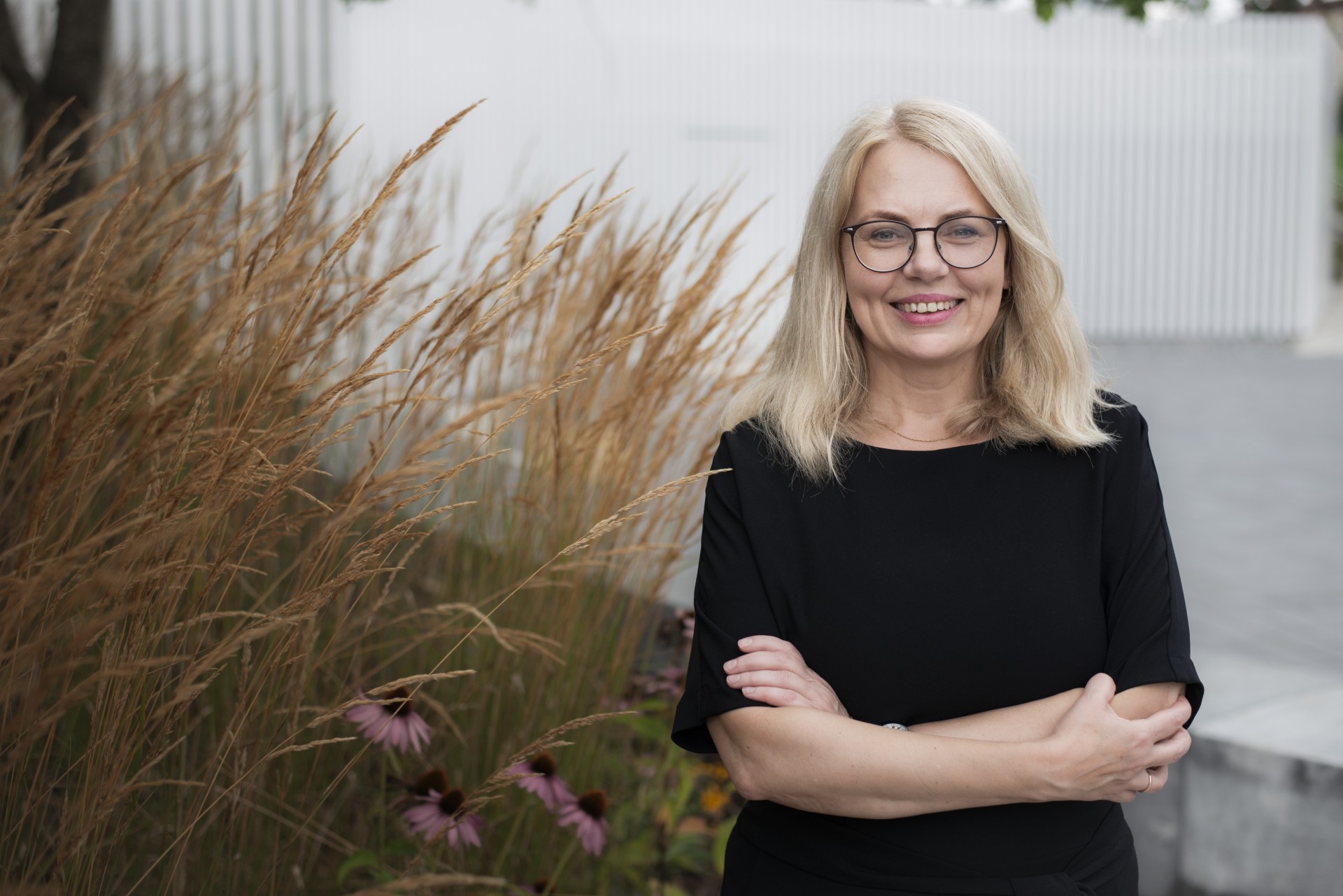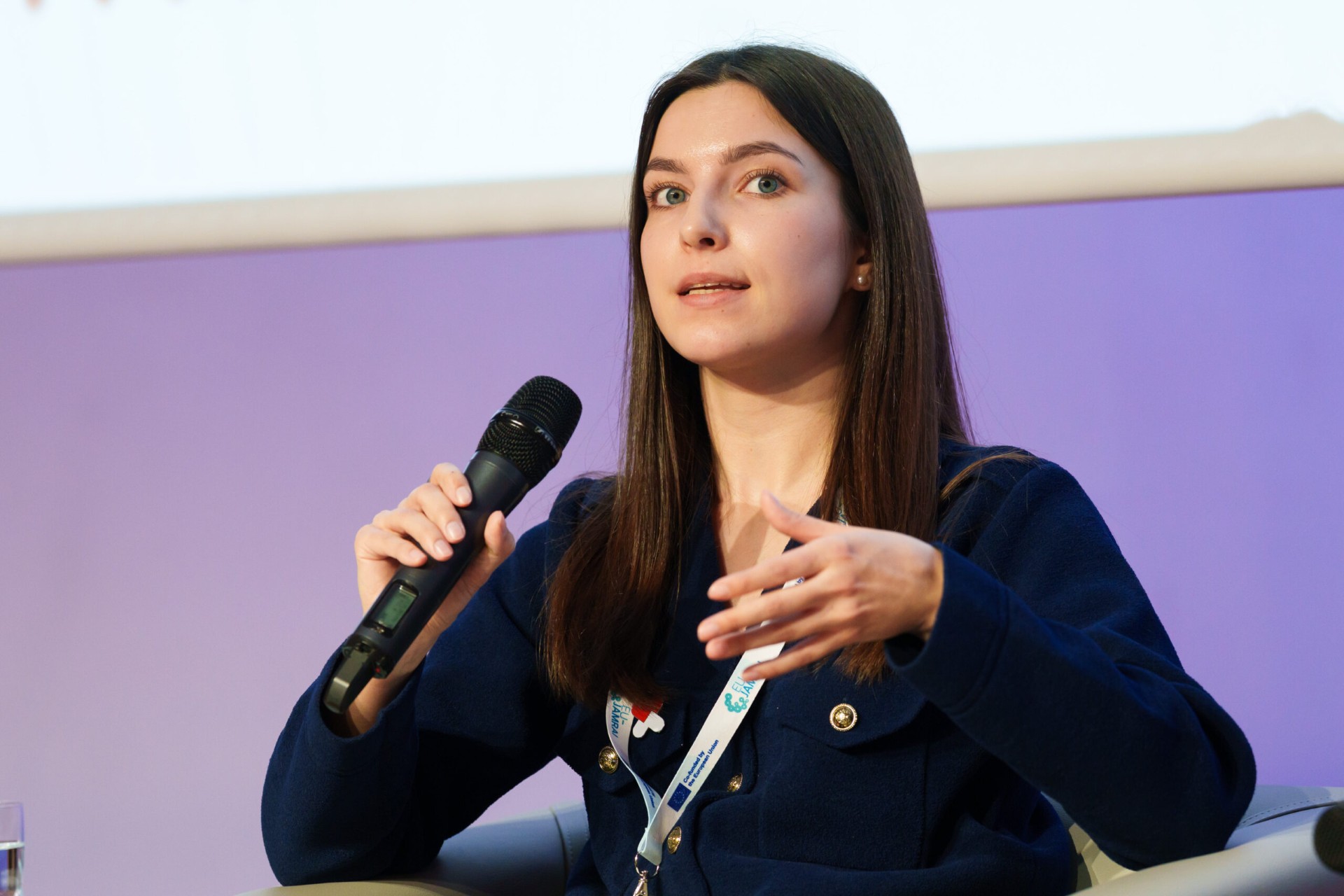Ten Years Since the Revival of Pharmacy Studies at Vilnius University: From Tradition to Innovation

This autumn marks ten years since the revival of the pharmacy study programme at the Faculty of Medicine (MF) of Vilnius University (VU). The community of academic staff and alumni are commemorating the year 2015, when, after a 65-year hiatus, the university resumed its training of pharmacists. This decade is an important stage in the history of pharmacy science in Lithuania, both historically and academically.
On this special occasion, the head of the VU Pharmacy and Pharmacology Centre, Assoc. Prof. Kristina Garuolienė, the former Dean of VU MF, Prof. Algirdas Utkus, who initiated the renewal of pharmacy studies, and Emilija Matelytė, an alumna of the first renewed pharmacy study programme, share with us their thoughts about how VU managed to develop the pharmacy study programme and what the prospects for this field are in Lithuania.
Revival of the study programme
The history of pharmacy at VU has deep roots, dating back more than two hundred years. The beginning of studies in this field is considered to be the establishment of the Department of Pharmacy in 1803. However, over time, geopolitical changes and the resulting recurring reorganisation, renaming, and even closing down of the university have repeatedly threatened the survival of this study programme.
After the Second World War, the study programme was affected by reforms. At that time, pharmacy students were trained at VU MF, but with the establishment of the Medical Institute in Kaunas in 1950, training was discontinued in Vilnius. The opportunity to resume the pharmacy study programme at VU only arose in 2015, after a prolonged break. The Pharmacy Centre was established at VU’s Institute of Biomedical Sciences for the development and implementation of the pharmacy study programme, and in 2020, the first graduates from the pharmacy study programme were awarded their master’s degrees.
According to Prof. A. Utkus, former Dean of VU MF, the idea to resume pharmacy studies at VU arose considerably earlier than a decade ago. “At that time, Prof. Zita Aušrelė Kučinskienė, the then Dean, and I discussed this topic and wanted to revive the pharmacy study programme. When I was appointed Dean in 2012, we took tangible steps because we already had a consensus within the faculty. We gathered a group of enthusiastic colleagues who were working at VU MF or the State Medicines Control Agency at the time, and we found a place for conducting studies at the premises of the university’s vivarium,” the professor explained.
 Prof. A. Utkus
Prof. A. Utkus
According to Assoc. Prof. K. Garuolienė, without a pharmacy study programme, university studies in the health sciences were somewhat incomplete: “You could say that it was an important missing link. At the very beginning, there was a lot of anxiety over administrative and economic problems and the adaptation of classrooms. Everyone eagerly waited for the first students and wanted to ensure that their studies would be of the highest quality. The study programme was designed in accordance with European standards so that the graduates would be able to work in European Union countries”.
E. Matelytė was one of the first students to enrol in the pharmacy programme. “I wanted to learn about different medicines and how they are used. From the very beginning, the studies were interesting, and the programme was well-structured and clear. There weren’t many students, so the lecturers knew each of us personally,” the alumna recalled. In E. Matelytė’s opinion, the care shown by the pharmacy programme coordinators for the students was memorable: “We were asked if we were satisfied with our studies and if we had any suggestions for improvement.” By adhering to European standards and cooperating with students, the pharmacy study programme was launched, and today, twice as many students are enrolling as when the programme was resumed.
Development of a high-level educational programme
Since 2015, VU MF has made noticeable progress in the field of pharmacy studies, developing a five-year degree programme that meets the highest standards. In addition to course units on the fundamental sciences, future specialists also study medicinal chemistry, pharmaceutical chemistry, and social pharmacy. Perhaps the most important events of the past decade have been the establishment of the Pharmacy and Pharmacology Centre and the integration of GIMMICS® – the Groningen Institute Model for Management in Care Services – into the study programme.
Since 2019, students have been participating in the GIMMICS® simulation game, a several-week-long experience in which teams of students manage simulated pharmacies. To date, only VU has integrated this programme into Lithuania.
The development of students’ pharmacy management skills has also been facilitated by the fact that, since 2020, students have had the opportunity to do internships at the University’s pharmacy, a formerly state-run pharmacy transferred to VU.
Over the course of a decade, a well-organised, stable study structure and clear learning programme schedules have been developed. Students often note that the VU pharmacy study programme places a strong emphasis on chemistry. This is an integral part of pharmaceutical science, and it is particularly popular with students who are interested in working in laboratories.
 Assoc. Prof. K. Garuolienė
Assoc. Prof. K. Garuolienė
The practical part of the pharmacy study programme is also very important; therefore, clinical pharmacy tasks are increasingly added to the programme, such as selecting medications for patients, determining doses, monitoring patients, and educating them about the use of medicines. This practice not only directs future pharmacists and pharmacologists towards patient care, but also allows them to consider their future workplace and the direction of their future activities. “A pharmacy science club has been operating since 2023, with students preparing independent research that they then present at the annual Student Research Network and international conferences,” Assoc. Prof. K. Garuolienė noted.
A decade that revealed the progress of the pharmacy field
Over the past decade, 181 pharmacy students have graduated from the programme – the fifth cohort receiving their diplomas this summer. Currently, there are about 240 pharmacy students at the university. According to Assoc. Prof. K. Garuolienė, the most important result of this decade of the pharmacy study programme is the success of its graduates. “We are very pleased and proud of their careers and what they are doing for Lithuania. The study programme is just a means to an end, but we feel the greatest reward when we see our graduates joining the pharmacy profession,” K. Garuolienė said.
E. Matelytė, a graduate of the first cohort of the VU pharmacy study programme, told us how, after her studies, she began her career in the field of medicines registration at a consulting company. Later, she left to work at the European Medicines Agency in the Netherlands, where she gained four years of work experience, and then returned to Lithuania. Currently, E. Matelytė is participating in the “Create Lithuania Programme” (“Kurk Lietuvai”), implementing a project at the Lithuanian Ministry of Health on the availability of innovative medicines in Lithuania. “Some of my classmates returned to work in their hometowns, while others found jobs in big cities. The choices made by all graduates were largely determined by personal circumstances. I went to work abroad, but now I feel the desire to share my international experience with colleagues in Lithuania,” she explained.
Since 2015, pharmacists trained at VU MF have been successfully employed by medicine retail and manufacturing companies, healthcare institutions, state institutions, research institutions, drug manufacturers’ representative offices, and pharmaceutical companies. This last decade has also been marked by an unprecedented challenge – the COVID-19 pandemic. Pharmacy students were unexpectedly faced with the opportunity to get involved in crisis management processes: educating and reassuring the public, providing consultancy, and volunteering.
Like many students at the Faculty of Medicine, E. Matelytė volunteered via telephone, helping the National Public Health Centre monitor people who were at high risk of contracting coronavirus, collecting information about their well-being and needs for social or psychological assistance during the isolation regime.
“We had a unique opportunity to observe how the pharmaceutical industry works: there was such a short period from complete uncertainty to the discovery of the first vaccines. This proved how effective cross-sector cooperation can be and strengthened confidence in the work of pharmaceutical specialists,” she reflected.
Excellent prospects for pharmacy specialists
According to Assoc. Prof. K. Garuolienė, pharmacy is an extremely secure career choice – specialists in this field often find employment before they even finish their studies. However, there is still a shortage of pharmacists in Lithuania, particularly in small towns. “The reality is that the current situation in physical pharmacies, where there is already a shortage of pharmacists, will be difficult to change because it is a privately operated business. Global trends show the online sales trend in the retail pharmacy field, and we will certainly not be able to avoid this. The other side of the coin is that the pharmacist’s workplace will move from the pharmacy to the doctor’s office, operating alongside the doctor. Prescription renewals and prescriptions will take place at the same institution where the patient comes for treatment,” Assoc. Prof. K. Garuolienė commented.
According to the associate professor, the university trains educated and flexible specialists who are open to innovation and who will be able to adapt to changes in the field of pharmacy. As the IT literacy of seniors increases, more and more people are able to find information and order medicines on their own. In the future, physical pharmacies should become just a place to buy medicines, but detailed consultations and personalised medicine selection should be transferred to healthcare institutions, where pharmacists will work. This is based on the assumption that a specialist can only provide quality advice and select medicines if they have detailed information about the patient and their conditions.
Today, the work of a pharmacist involves more than just advising patients and selling medicines. These specialists also prepare medicines and perform certain health checks on patients who come to the pharmacy, such as measuring blood pressure. In addition, due to the increase in the incidence of influenza and tick-borne encephalitis, as well as due to the reforms brought about by the COVID-19 pandemic, pharmacies have begun to actively vaccinate patients. In this way, the prestige of pharmacists in society is growing, and they are often trusted no less than doctors.
According to E. Matelytė, specialists who have completed their studies in pharmacy can work at national and European institutions, such as the European Medicines Agency, the European Chemicals Agency, the European Commission, or the European Union Drugs Agency. The knowledge acquired during pharmacy studies does not necessarily lead to a career as a pharmacist – there are countless other opportunities and ways to apply this knowledge.
 E. Matelytė
E. Matelytė
“Some wish to become health professionals – advising people on possible drug interactions, while others see themselves in health policy, making decisions in the field of pharmaceutical policy. At the European Medicines Agency, I joined the drug shortage management team, where I was responsible for managing drug shortages caused by the COVID-19 pandemic, and we also implemented a regulation empowering the European Medicines Agency to have a greater role in crisis preparedness and management. I was responsible for various strategic and technical interinstitutional projects, the management of critical shortages of antibiotics and other important medicines, and events that could affect the supply of medicines,” E. Matelytė described, sharing her experience.
According to Prof. A. Utkus, talented students are attracted to this study programme, and the number of students is increasing every year. “I would like this programme to continue to be just as attractive to our young people, to progress, and to focus not only on training pharmacists for work in pharmacies, but also more broadly on pharmacogenetics and pharmacogenomic research, which serve personalised medicine. This approach is already being developed in the West, so I believe that this is also the future of Lithuanian pharmacists: we can be interesting to the world if we create things that change the world,” he added.
According to Assoc. Prof. K. Garuolienė, in the future, VU plans to add a postgraduate pharmacy study programme and train clinical pharmacists who would work in hospitals and healthcare institutions and provide significant assistance in selecting medications, their dosages, and possible drug interactions, taking into account the symptoms and conditions of patients.
“This is required by the evolving situation: there are more and more drugs, so knowing about them all is a real challenge. Therefore, in the future, pharmacists will begin to specialise in certain groups of drugs, such as drugs used in oncology, biological therapy, autoimmune diseases, and so on. The field of pharmacy is quite well developed in other countries, such as Sweden. Pharmacists in hospitals communicate with patients, select medications for them, and take a significant load off the doctors and nurses. Clinical pharmacy studies already exist in Estonia and Latvia, so we should prepare for this as well,” suggested the associate professor.